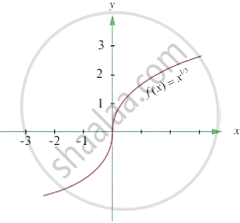Advertisements
Advertisements
प्रश्न
Prove that the function
उत्तर
The given function can be rewritten as:
We observe
(LHL at x = 0) =
(RHL at x = 0) =
So,
\[\lim_{x \to 0^-} f\left( x \right) \text{and} \lim_{x \to 0^+} f\left( x \right)\]
Thus, f(x) is discontinuous at x = 0, regardless of the choice of k.
APPEARS IN
संबंधित प्रश्न
Discuss the continuity of the following functions. If the function have a removable discontinuity, redefine the function so as to remove the discontinuity
`f(x)=(4^x-e^x)/(6^x-1)` for x ≠ 0
`=log(2/3) ` for x=0
Find the values of p and q for which
f(x) = `{((1-sin^3x)/(3cos^2x),`
is continuous at x = π/2.
Prove that the function f (x) = 5x – 3 is continuous at x = 0, at x = – 3 and at x = 5.
Examine the continuity of the function f(x) = 2x2 – 1 at x = 3.
Find all point of discontinuity of f, where f is defined by `f (x) = {(2x + 3, if x<=2),(2x - 3, if x > 2):}`
Find all points of discontinuity of f, where f is defined by `f(x) = {(|x|+3, if x<= -3),(-2x, if -3 < x < 3),(6x + 2, if x >= 3):}`
Find all points of discontinuity of f, where f is defined by `f(x) = {(|x|/x , if x != 0),(0, if x = 0):}`
Find all points of discontinuity of f, where f is defined by `f(x) = {(x^3 - 3, if x <= 2),(x^2 + 1, if x > 2):}`
Determine if f defined by `f(x) = {(x^2 sin 1/x, "," if x != 0),(0, "," if x = 0):}` is a continuous function?
Examine the continuity of f, where f is defined by `f(x) = {(sin x - cos x, if x != 0),(-1, "," if x = 0):}`
Find all the points of discontinuity of f defined by `f(x) = |x| - |x + 1|`.
Using mathematical induction prove that `d/(dx) (x^n) = nx^(n -1)` for all positive integers n.
Find the value of constant ‘k’ so that the function f (x) defined as
f(x) = `{((x^2 -2x-3)/(x+1), x != -1),(k, x != -1):}`
is continous at x = -1
Test the continuity of the function on f(x) at the origin:
\[f\left( x \right) = \begin{cases}\frac{x}{\left| x \right|}, & x \neq 0 \\ 1 , & x = 0\end{cases}\]
For what value of λ is the function
\[f\left( x \right) = \begin{cases}\lambda( x^2 - 2x), & \text{ if } x \leq 0 \\ 4x + 1 , & \text{ if } x > 0\end{cases}\]continuous at x = 0? What about continuity at x = ± 1?
Find the points of discontinuity, if any, of the following functions: \[f\left( x \right) = \begin{cases}2x , & \text{ if } & x < 0 \\ 0 , & \text{ if } & 0 \leq x \leq 1 \\ 4x , & \text{ if } & x > 1\end{cases}\]
In the following, determine the value of constant involved in the definition so that the given function is continuou:
The function f (x) = tan x is discontinuous on the set
Show that the function f given by:
`f(x)={((e^(1/x)-1)/(e^(1/x)+1),"if",x,!=,0),(-1,"if",x,=,0):}"`
is discontinuous at x = 0.
If f(x) = `{{:("a"x + 1, "if" x ≥ 1),(x + 2, "if" x < 1):}` is continuous, then a should be equal to ______.
`lim_("x" -> pi/2)` [sinx] is equal to ____________.
The number of discontinuous functions y(x) on [-2, 2] satisfying x2 + y2 = 4 is ____________.
`lim_("x"-> 0) sqrt(1/2 (1 - "cos" 2"x"))/"x"` is equal to
How many point of discontinuity for the following function for x ∈ R
`f(x) = {{:(x + 1",", if x ≥ 1),(x^2 + 1",", if x < 1):}`
Sin |x| is a continuous function for
Let a, b ∈ R, b ≠ 0. Define a function
F(x) = `{{:(asin π/2(x - 1)",", "for" x ≤ 0),((tan2x - sin2x)/(bx^3)",", "for" x > 0):}`
If f is continuous at x = 0, then 10 – ab is equal to ______.
Let α ∈ R be such that the function
f(x) = `{{:((cos^-1(1 - {x}^2)sin^-1(1 - {x}))/({x} - {x}^3)",", x ≠ 0),(α",", x = 0):}`
is continuous at x = 0, where {x} = x – [x], [x] is the greatest integer less than or equal to x.
If the function f defined as f(x) = `1/x - (k - 1)/(e^(2x) - 1)` x ≠ 0, is continuous at x = 0, then the ordered pair (k, f(0)) is equal to ______.
Find the value(s) of 'λ' if the function
f(x) = `{{:((sin^2 λx)/x^2",", if x ≠ 0 "is continuous at" x = 0.),(1",", if x = 0):}`
Find the value of k for which the function f given as
f(x) =`{{:((1 - cosx)/(2x^2)",", if x ≠ 0),( k",", if x = 0 ):}`
is continuous at x = 0.
If f(x) = `{{:((kx)/|x|"," if x < 0),( 3"," if x ≥ 0):}` is continuous at x = 0, then the value of k is ______.
Consider the graph `y = x^(1/3)`

Statement 1: The above graph is continuous at x = 0
Statement 2: The above graph is differentiable at x = 0
Which of the following is correct?
